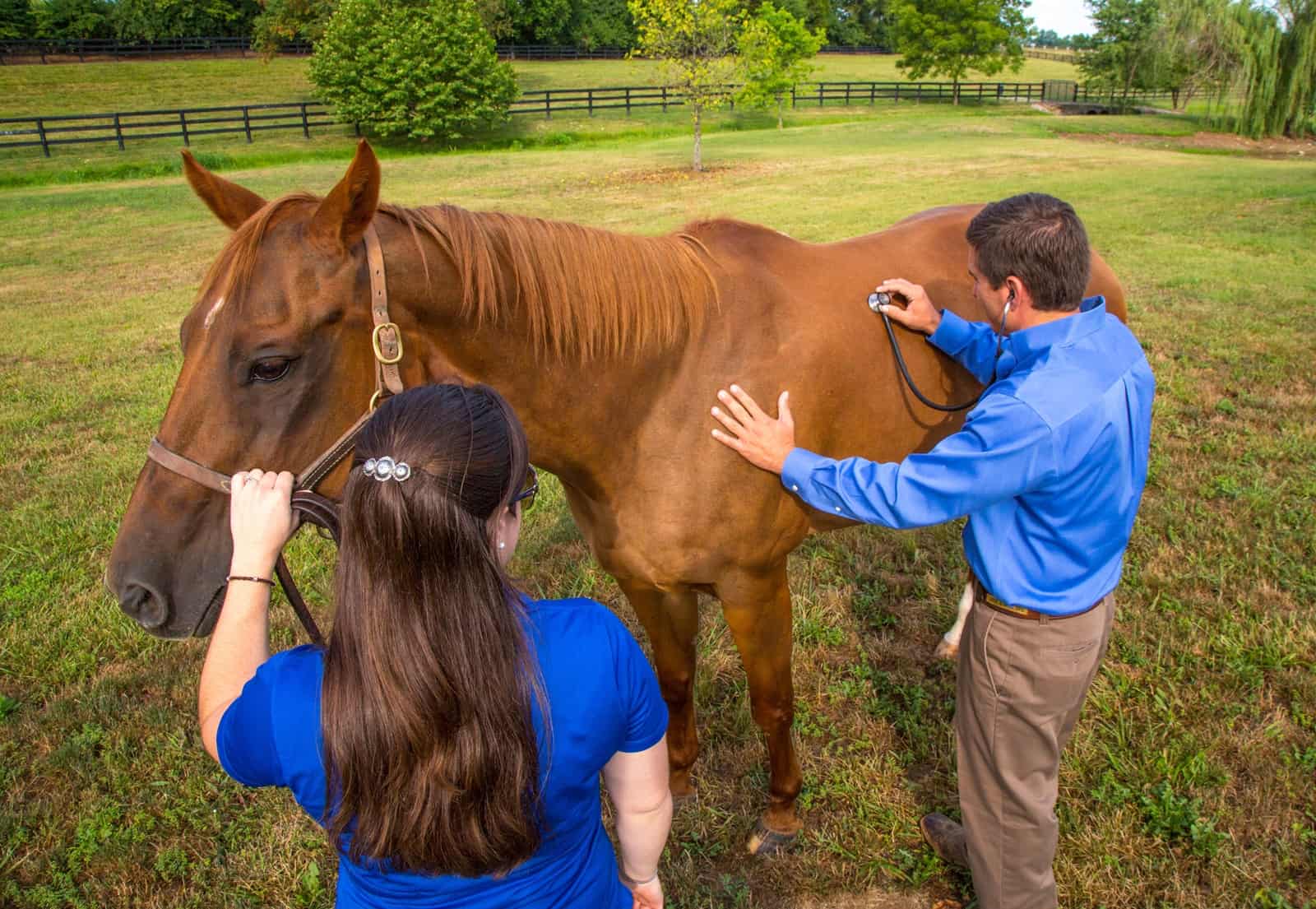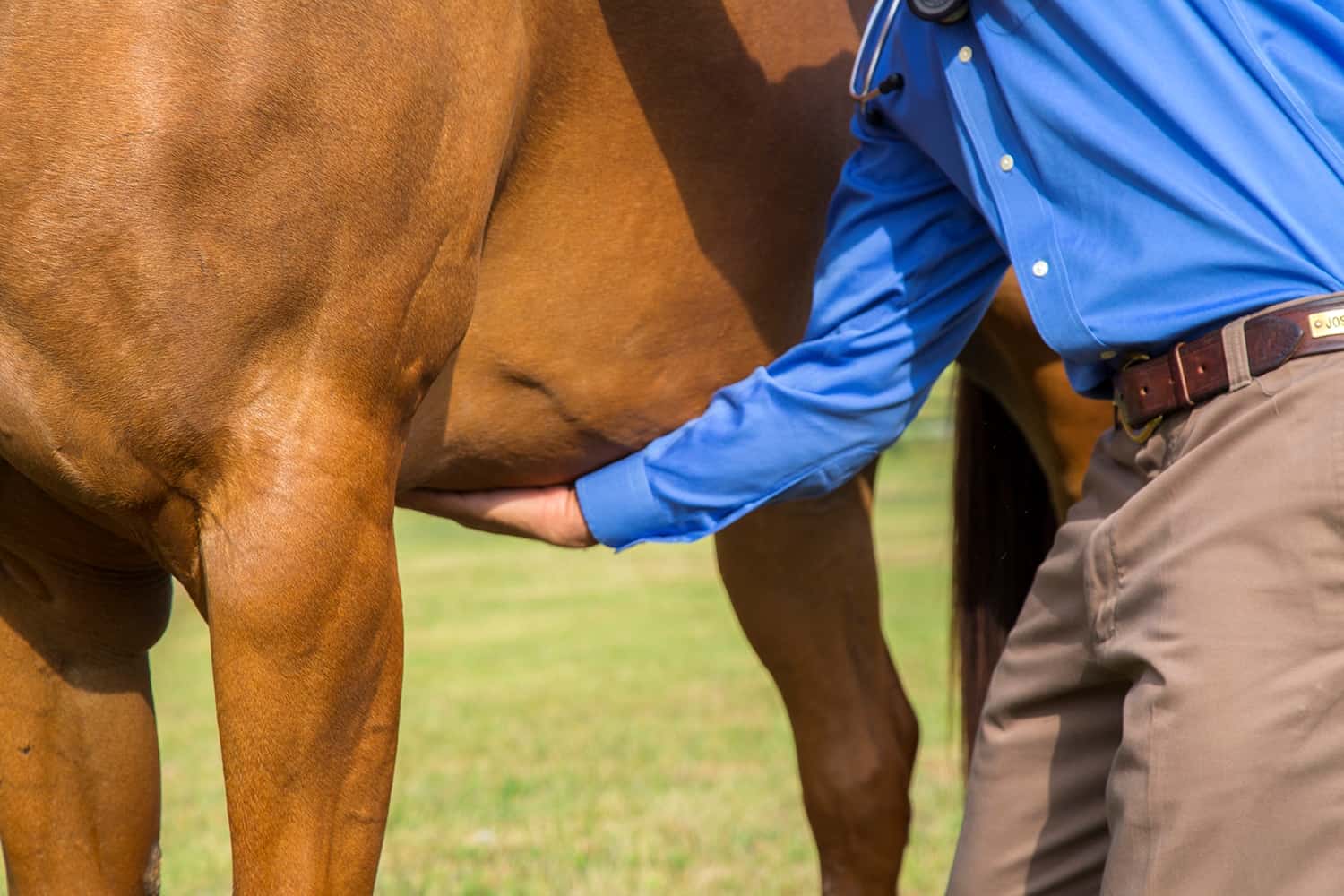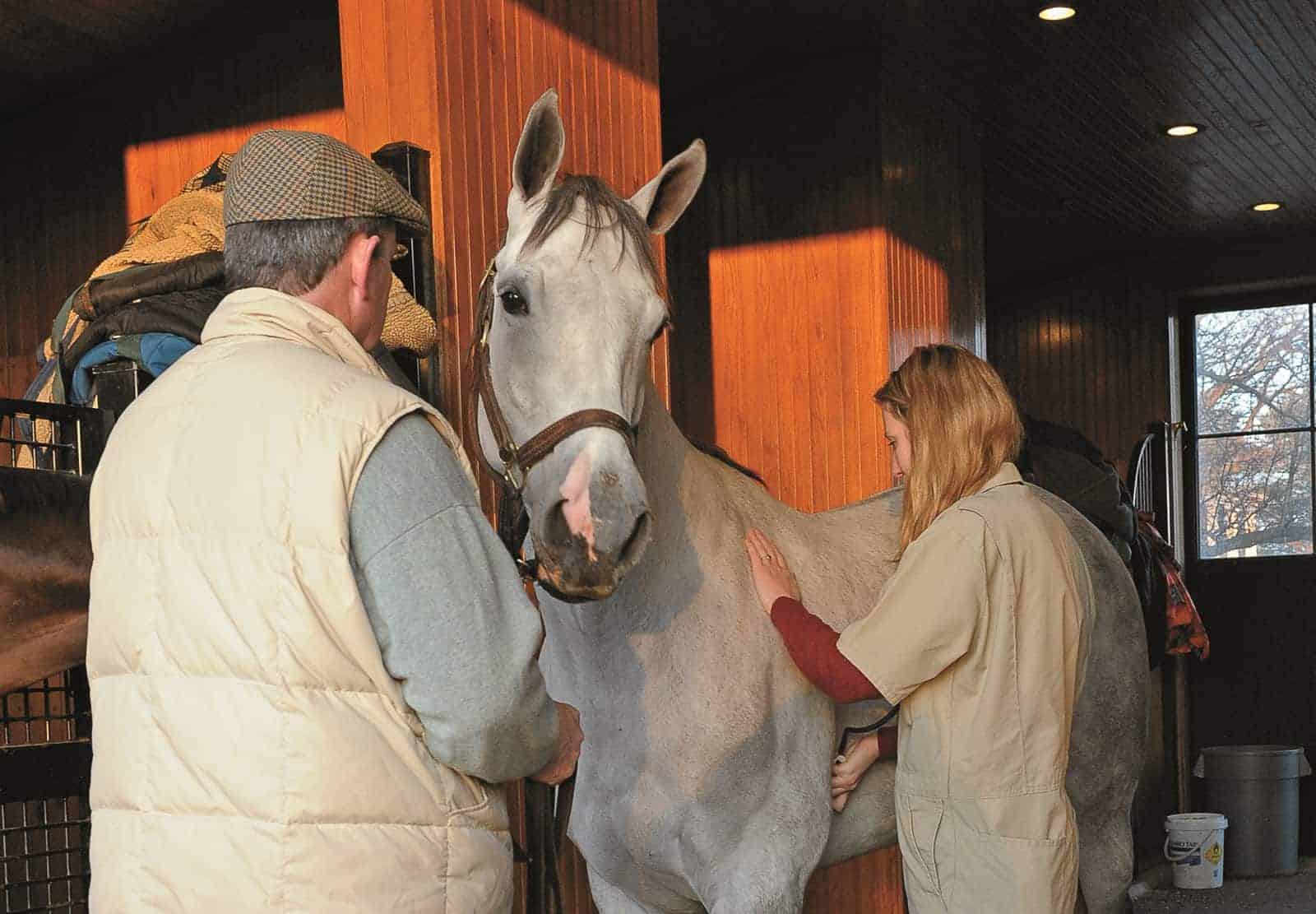Equine Prepurchase Exams: Not Just Looking for Lameness
- Topics: Anatomy & Physiology, Article, Cancer, Diagnosing Hoof Lameness, Diagnosing Lameness, Diagnostics and Technology, Drug Testing, Endoscopy, Farm and Barn, Heart & Cardiovascular Problems, Horse Care, Injuries & Lameness, Lameness, Other Eye Problems, Other Respiratory Problems, Purchase Exams, Radiography (X rays), Sports Medicine, Vet and Professional, Vital Signs & Physical Exam, Working With a Veterinarian

What conditions beyond lameness might a veterinarian uncover during a prepurchase exam?
Buying a horse might be one of the most exciting things an equestrian can do. Just the thought of one’s next (or first) horse can send riders racing to their favorite equine classified websites. Dreams of loading a new steed into the trailer and bringing him home commence. But before you fall in love and sign on the dotted line, there is one important step in the horse-buying process you shouldn’t skip—the prepurchase exam.
This amounts to hiring a veterinarian to perform a veterinary exam on a prospective horse. “A prepurchase exam does not eliminate all risk but should give you an adequate first impression and risk assessment for the animal you are purchasing” on that particular day, says Woodrow Friend, DVM, an ambulatory veterinarian with a special interest in sport horses at Rood & Riddle Equine Hospital in Lexington, Kentucky.
Issues of concern that most frequently pop up during a prepurchase exam involve lameness, but there are many other conditions that could be apparent that are capable of affecting a horse’s future health and performance. While these less-common findings might or might not be deal–breakers, they are just as important to be aware of as lameness issues. Here we’ll take a look at what goes on during a prepurchase exam and explore some of the more unusual conditions veterinarians might find.
The Exam Itself
A prepurchase exam can be as in-depth as the potential buyer wants. These exams might include any or all of the following:
- An overall physical exam;
- A lameness exam;
- A neurologic exam;
- Radiographs (X rays);
- An endoscopic exam (a “scope” of the upper respiratory tract);
- Blood work; and
- A drug screen for specific drugs.
Additionally, a serum biochemistry panel and complete blood count can provide an overall look at organ health and reveal hidden infections or conditions, respectively, especially if the horse is older.
Ashley Embly, DVM, an ambulatory sport horse veterinarian with Rood & Riddle who splits her time between the Lexington and Wellington, Florida, locations, almost always performs a drug screen to make sure the seller has not tranquilized the horse or used pain-relieving medication to make the horse appear calmer or perform better than normal.
“I have tons of trainers who, first thing when I get there, say to pull a drug screen because it protects everyone,” says Embly. “They want the people buying that horse to know they haven’t given it anything, because it’s their reputation on the line, too.”
The veterinarian asks the trainer or seller about the horse’s medical history, current care and maintenance measures, level of work, training regimen, and performance record.
During the physical exam, the veterinarian goes over every inch of the horse:
- Looking at the eyes, ears, mouth (and teeth), nostrils, and feet for abnormalities;
- Listening to the heart, lungs, and gastrointestinal tract for sounds that could indicate a problem; and
- Palpating the horse’s muscles and joints for signs of pain, heat, swelling (soft or hard), skin problems, or variations in muscle tone.
Not-So-Obvious Findings
The extent of the prepurchase exam might broaden if something comes up that could indicate a deeper health issue, says Elizabeth Barrett, DVM, MS, Dipl. ACVS, a sport horse veterinarian at Hagyard Equine Medical Institute, also in Lexington. For example, “if the horse makes an abnormal respiratory noise during the lameness (exam), we may perform endoscopy and see an abnormality of the upper airway,” she says.
Radiographs can pick up on things—lameness-causing or otherwise—that aren’t evident on an initial physical exam. Sometimes they yield surprising findings, to the veterinarian as well as the seller. For instance, Mike Pownall, DVM, owner of McKee-Pownall Equine Services, in Ontario, Canada, has found orthopedic screws in a horse’s leg upon X ray.
While it’s standard practice to radiograph a sale horse’s legs, it’s uncommon to radiograph other parts of the horse. It might be warranted, however, if the horse is going to be a high-performance athlete, such as an eventer or an endurance mount.
“A lot of people do not radiograph the skull to look at dental or sinus issues,” says Friend, but, “I’ve seen sinus cysts that you wouldn’t find unless you radiographed the skull.”
Barrett says the “usual unusual” things she sees on prepurchase exams include eye-related issues, such as cataracts or corneal scars, as well as heart murmurs and arrhythmias.
Some additional findings our veterinarians have found, by category, include:
Respiratory problems (e.g., equine asthma, allergies, left recurrent laryngeal hemiplegia, entrapped epiglottis, dorsal displacement of the soft palate) “An endoscopic exam can rule out some airway problems that may not be clinical (causing signs of illness) without looking, such as ethmoid hematomas (masses in the paranasal sinuses),” says Friend.
Embly says she asks that horses be ridden, particularly at the canter, during an exam, because that can also provide auditory clues for particular types of illness, such as a cough from an infection or “roaring” in the case of left recurrent laryngeal hemiplegia. Typically veterinarians can manage, treat, or resolve respiratory conditions with medications or surgery.

Gastrointestinal problems (e.g., previous colic surgeries, gastric ulcers) The veterinarian could find a surgical scar along the horse’s abdomen that indicates the horse has had colic surgery; in some cases the seller might not even know about the procedure because the horse had it before he or she bought him.
“We are able to get the horses back to their previous or better performance level (post-colic surgery),” says Embly, “but it is something to be aware of because, depending on the surgery, it can make them slightly more likely to colic again or to form adhesions” between intestines and other abdominal structures.
Ophthalmic issues (e.g., vision loss, uveitis) These can be serious. “We do see vision issues, and (the eyes are) one of the first areas we examine, because that could limit the appropriateness of the horse for the intended job,” says Pownall, who notes that vision might particularly be a deal-breaker for a child’s mount. “We have seen many parents refuse to go forward with the rest of the exam because of their concerns about their child riding a horse with a vision issue.”
Vision problems can also be no-gos for many of Embly’s competitive clients because jumpers and eventers must have depth perception to make it around a course safely. Horses with vision problems also tend to be a bit spookier.

Heart conditions (murmurs, arrhythmias, and other cardiac abnormalities) If Embly detects a cardiac condition, some of her clients want to investigate it further to determine to what extent it might limit the horse’s performance. That is when she refers them to an internal medicine specialist.
“Heart is kind of a big scary one for me,” she says. “I want (these performance horses) to have a very good heart.”
Cancer (e.g., melanoma, sarcomas) If the veterinarian finds a potentially cancerous lump, sometimes the prepurchase stops there; there is not much more he or she can do to elucidate the problem.
“With something like a mass that may appear to be cancer, we can really only go off of appearance, as taking a biopsy to accurately diagnose is fairly invasive for a prepurchase exam and would require written consent from the current owner,” says Barrett.
Embly calls melanoma a true risk for the buyer, because whether it will end up growing and putting the horse’s life at risk or remain small and harmless depends on the animal, where the melanoma is located, and how advanced it is.
“Certain tumors, like sarcoids, can remain nonissues or they can become huge cosmetic or functional issues relatively quickly, and it’s not always easy to predict how they will behave,” says Barrett.
Neurectomies While we like to believe everyone in a horse deal is being completely honest, this is not always the case, says Embly. So it’s important to mitigate your risks by getting a truly thorough prepurchase exam that can reveal prior procedures such as neurectomies, in which certain nerves have been cut to remove sensation in an area, such as in horses with navicular issues.
“I’ve had many prepurchases where the horse has been nerved, and there’s no one fessing up that the horse has been nerved,” she says. “But I go and clamp hemostats (instruments used to compress blood vessels) on a horse’s heels, and the horse doesn’t move its leg because someone has cut the nerve to its foot, and they can no longer feel their foot. Things like that do happen.”
While horses that have been nerved can be productive and pain-free for some time, the procedure is associated with many side effects, and the navicular-associated lameness will return at some point.
Now What? How to Sell a Horse With a Health Condition
When a prepurchase exam reveals a health issue the current owner wasn’t aware of, it can leave him or her wondering what to do next, especially if the horse’s sale is necessary.
“I think when the owner is really up front about what the horse needs so that horse can do its best, that there are owners for everything,” says Ashley Embly, DVM, an ambulatory veterinarian with Rood & Riddle Equine Hospital, in Lexington, Kentucky, and Wellington, Florida. “It can be done, and things can get sold that aren’t perfect. I don’t think there is a perfect horse.”
Elizabeth Barrett, DVM, MS, Dipl. ACVS, a sport horse veterinarian at Hagyard Equine Medical Institute, also in Lexington, agrees, adding that being forthright allows potential buyers to understand what they are getting into.
“If a special condition is present, I think one of the best things a horse owner can do is to have it evaluated by a specialist in the field who can provide them with a summary of the condition that they can provide to potential buyers or their veterinarians,” she says.
Mike Pownall, DVM, owner of McKee-Pownall Equine Services, in Ontario, Canada, also suggests the seller provide medical and competition records showing that the horse has competed with the condition. “Having a track record of performance while the horse has a potentially limiting condition is often the best way to allay any concerns,” he says.
Woodrow Friend, DVM, also of Lexington’s Rood & Riddle, warns that not disclosing a known medical issue could have ramifications for the seller. “If there is something like a tumor and you hide it, you’ve lost all of your trust,” he says. “If the buyer is informed rather than surprised, they are more likely to look past a condition.”
Trust is crucial for the buyer-seller relationship, not just for the sake of the sale but, ultimately, for the sake of the horse.
—Sarah Evers Conrad
Risk Assessment
It’s important for potential buyers to discuss with their veterinarians what they are looking for in a mount and for what level of use. Pownall says expectations will be different for a pleasure horse that is ridden once a week than for a horse that will be shown throughout the year, regardless of breed or discipline.
Many of the problems mentioned have the potential to be performance-limiting, depending on the horse’s intended use. Therefore, it’s important for a veterinarian to present the potential buyer with all the findings so that person can weigh the pros and cons and decide if the horse is a good buy for them. After all, while the prepurchase exam is designed to uncover issues, the client ultimately makes the buying decision.
If the horse is being purchased as a breeding prospect, a reproductive exam can provide information about the health of the reproductive organs and the horse’s viability for breeding. If a horse will only be used for breeding, many health issues that would be red flags for riding horses might not be as concerning.
“If you’re buying a horse as a broodmare, one-eye blindness is very different than if you’re intending to use the horse as a show jumper,” says Friend.
However, if the problem could become a costly medical condition that goes beyond the value of the horse and its potential offspring, then the buyer must weigh the risks to determine if it is worth it.
Barrett says sometimes sellers are unaware of a condition because their horse has been performing well despite it. “What we are looking at is: Will it continue to not be an issue long-term? Is it rapidly progressive? Will it affect this new owner more than the old?”she says. “Perhaps this horse is a resale project, and this will heavily affect the chances of resale, or the new owner wants to move the horse up a level and this issue may affect performance.”
A condition’s severity might correlate directly with the horse’s current management and lifestyle. “For instance, there are several upper-level event and grand prix horses that flex mildly positive (on a lameness exam flexion test), but a horse mildly sore competing at that level would be less concerning than a horse that’s been out to pasture for six months that flexes positive,” says Friend.
A buyer who has a long-standing relationship with the veterinarian performing the prepurchase exam has an advantage over one working with an unknown veterinarian because their own practitioner knows what his or her client likes in a horse and what health issues he or she will be able to handle.
“Certain conditions that one client may be okay with managing will cause another to walk away from the sale,” says Friend.
Pownall reminds us, “No horse is perfect, so we always discuss realistic expectations for the horse.”
Regardless of the findings, doing one’s due diligence when considering a major purchase such as a horse just makes good financial sense.
Written by:
Sarah Evers Conrad
Related Articles
Stay on top of the most recent Horse Health news with












